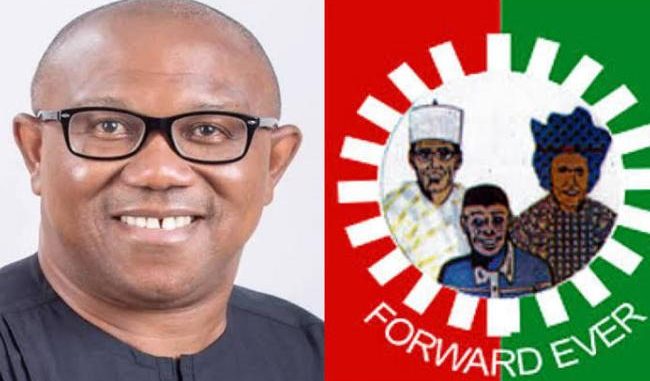
The 2023 presidential candidate of the Labour Party (LP), Mr Peter Obi, has again placed the blame of the leadership crisis in the party on the doorstep of the Federal Government, accusing it of deploying several tactics, including propaganda, to fuel the discord in the opposition party.
Obi, a former governor of Anambra State, also x-rayed the two years of President Bola Tinubu’s administration, submitting that some of its key decisions like the removal of fuel subsidy, floating of the Naira, tackling insecurity and execution of the Lagos-Calabar Coastal Road did not yield the desired results because they were not done in an “organised” manner.
Speaking during an interview aired by Arise News on Monday, Obi claimed that the government instigated and sustained the crisis in the LP for its own interest.
Responding to a question on the crisis, he stated, “This is what you get, always, right? This is what you get always in Nigeria, because we now live in a country of propaganda and lies – and they manufacture it.
“The problem we have in Labour Party is a problem instigated and sustained by the government of today.
“I don’t need to tell you when you have a party chairman who calls a state governor a dwarf and dwarf thinking. Forget about me, so it’s not weak.
“Okay, I’m weak, but it’s not weak. Is every other person there weak? So we’re not sincere with ourselves.
“You speak the truth and they call you names. And we now live in a country of propaganda and lies. They are trying to put problems everywhere, they want to even put problems in families.”
The LP today has at least two major factions. There is a faction where Obi, Abia State State governor, Dr Alex Otti, Sen. Victor Umeh, Sen. Ireti Kingibe, Sen. Darlington Nwokocha and a host of other stakeholders, belong. The faction is led by a former Minister of Finance, Sen. Nenadi Usman, as the National Caretaker Committee (NCC) chairman.
There is another faction led by the National Chairman of the LP, Barrister Julius Abure, which insists it has control over the 36 state chapters of the party and the Federal Capital Territory (FCT). The faction currently occupies the Utako, Abuja national secretariat of the party.
On the removal of fuel subsidy, one of the earliest decisions of the current administration, Obi criticised the manner it was done, arguing that it was effected without a proper plan.
However, he admitted that he would have removed the subsidies as a president, but with a different approach.
He explained, “I consistently said I would have removed the fuel subsidy. In my manifesto, it is there; steps that I would have taken to do it in an organised manner. Nothing is wrong in removing subsidy.
“What is wrong is the haphazard way in which it was announced and implemented. Everybody knows that the subsidy regime was a criminality and had a lot of corruption, which needed to be unbundled.”
Obi said an organised way of removing subsidy was first to “remove the criminality, which is 50% of the problem. Sit with the operators and come up with a pricing that will be agreed to, and whatever is saved from it, have a specific place for investing it.”
The former governor added that there should have been a “national plan” on how to invest or utilise the savings from subsidy removal.
“It is not just for sharing (the money) the way we used to share every other money, no!”, he stated.
He said the government had assured Nigerians that removing subsidy was to free funds for other development purposes, encourage savings and reduce borrowing.
“But, honestly, the billions saved, where is it? Where is it invested in critical areas of development? Critical areas of development are education, health and pulling people out of poverty. Has any of these three been improved? No”, Obi argued further.
He observed that what Nigerians had faced in the last two years were skyrocketing prices, a weaker Naira and low productivity.
Speaking specifically on the floating of the Naira, Obi said he would have approached it by focusing on ramping up production in the economy first in areas like agriculture, manufacturing and every other critical sector to gradually strengthen the currency.
He opposed the government’s decision to embark on the construction of the Lagos-Calabar Coastal Road, saying that it exposed its limited understanding of the security situation of the country.
“The insecurity (in Nigeria) is far more fundamental than roads.
Would you prefer a Lagos-Calabar Coastal Road when the internal roads are not motorable?
“If you say our problem is insecurity, our problem is power, then let’s deal with those things. How do you go to your village when there is insecurity?”
Leave a Reply